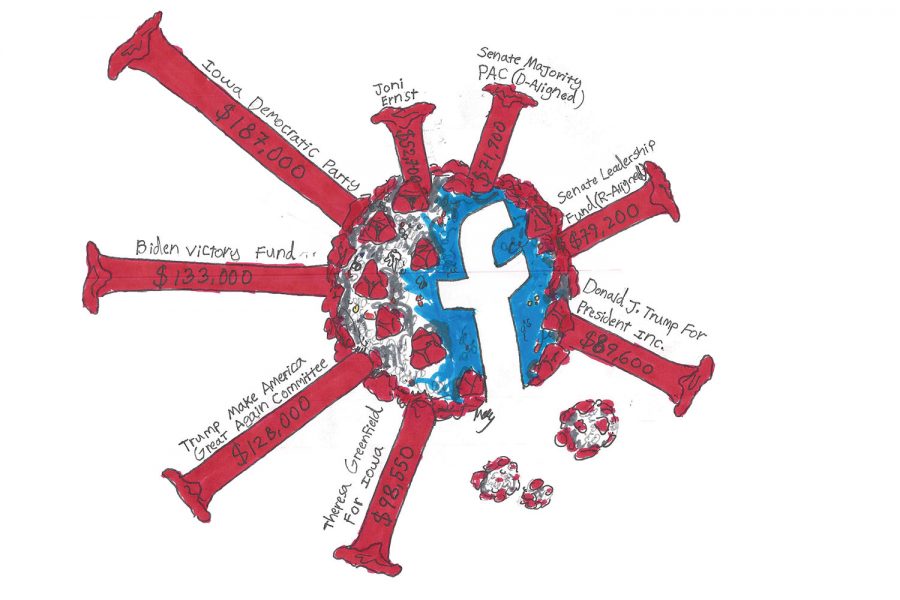Iowa candidates in competitive seats navigate campaigning during COVID-19
Candidates in some of Iowa’s most competitive races are trying to navigate campaigning during a global pandemic and push their messaging through virtual platforms.
September 27, 2020
Republican and Democratic candidates for the U.S. House and Senate in Iowa are navigating a new culture of campaigning in contentious races many election experts consider to be toss ups.
These candidates, in races crucial to their party’s efforts to either hold or flip a seat, are pushing their messages through social media, Zoom rallies, and socially distanced events.
The COVID-19 pandemic has forced campaigns to put limitations on in-person gatherings and shift to virtual events as a way to bring together large groups of voters. With less than two months until Election Day, these final weeks would typically be spent shaking hands in local restaurants and stumping at campaign rallies to call on Iowans to actually go to the polls Nov. 3.
While large, in-person events are currently being avoided, many campaigns nationally have seen how virtual events can increase accessibility for voters who don’t typically make it out to hear candidates stump.
Rita Hart, Democratic candidate in Iowa’s 2nd Congressional District, launched her “backyard talks” tour on Sept. 18 after not holding any in-person events since the pandemic unfolded. Hart is meet with small groups of Iowans outdoors and socially distanced.
Iowa State Sen. Mariannette Miller-Meeks, R-Ottumwa, is the Republican nominee for the U.S. House in the 2nd District, and unlike Hart, Miller-Meeks has been running a door-knocking campaign and traveling the district since late July.
“We wear a mask, we step back from the door, so we’re very respectful of anybody who comes to the door,” Miller-Meeks said of her campaign’s door-knocking efforts. “I personally haven’t interacted with anybody who … told us to get away or been angry that we’re at the door.”
Infographic by Lauren White/The Daily Iowan
Hart said she envisioned this campaign to look like the campaigns she ran while serving in the Iowa Senate — traveling the district, knocking on doors, and speaking in front of large crowds.
Hart also ran for lieutenant governor with former Democratic gubernatorial candidate Fred Hubbell in 2018, when she traveled the entire state to shake hands with voters.
“The typical kind of campaigns that we’re all used to — that all came to a grinding halt,” Hart said.
Since the launch of their campaigns through June 30, Hart has raised more than $1.8 million and Miller-Meeks has raised just under $900,000. These fundraising numbers are not low for what the 2nd Congressional District typically sees — in 2014, Miller-Meeks raised about $940,000 during her entire campaign, and incumbent Democrat U.S. Rep. Dave Loebsack raised more than $1.7 million.
Jeremy Busch, director of campaign communications for the Iowa Democratic Party, said Democratic candidates in Iowa and the state party have focused on virtual outreach to voters, specifically to get Iowans registered to vote.
Busch said there is some evidence that outreach is working — as of Sept. 24, more than 570,000 Iowans have requested an absentee ballot, and 55 percent of those ballots have been requested by registered Democrats, according to the Iowa Secretary of State’s office. Twenty-nine percent of those ballots have been requested by registered Republicans.
U.S. Rep. Dave Loebsack, a Democrat, announced last year that he would not seek re-election to the 2nd District seat he’s held since 2007. Former U.S. Rep. Jim Leach, a Republican, represented the area of Iowa’s 2nd Congressional District for 15 terms before Loebsack took office.
This is Miller-Meeks’ fourth run for Congress in the district after losing to Loebsack in three elections. Miller-Meeks, an ophthalmologist, ran the Iowa Department of Public Health from 2011 to 2014 and was elected to the state Senate in 2018, where she currently serves.
Miller-Meeks said that, before the June primary election, the pandemic added a layer of complexity to her dual-roles as state senator and candidate for Congress. The state Legislature was in session in the spring with some breaks caused by COVID-19, and Miller-Meeks was running against four other Republican opponents.
She said she was focused on helping small businesses apply for the Paycheck Protection Program, working with people who needed unemployment benefits, and making sure people received their stimulus checks.
“[My campaign] felt that it was more important to address the needs of people and how to help people navigate to the pandemic than it was that we actually campaign,” Miller-Meeks said.
The most recent Des Moines Register/Mediacom Iowa Poll asked voters which party’s candidate they would vote for in their congressional district, with 50 percent of likely voters saying they would vote Democrat and 46 percent voting Republican in the 2nd Congressional District. A group of 658 likely voters were polled statewide between Sept. 14 and Sept. 17 with a margin of error of 8.7 percentage points.
The Hart campaign has produced 11 video advertisements that have aired on television, streaming services, YouTube, and Facebook, and other digital platforms, according to the campaign.
The Miller-Meeks campaign has aired two campaign advertisements on television and streaming services. Miller-Meeks spokesperson Eric Woolson said the campaign’s “focus has been largely on television viewers across the district,” and it’s not had a large number of digital ads and could not give an estimate.
Hart said it’s disconcerting to see people gathering in large groups without masks on — as seen at events hosted by Republican Sen. Joni Ernst.
“It’s really quite remarkable that we have not been able to use this moment as a way to bring people together on a common goal of having a healthier environment for all of us, and getting through this in the best way possible,” Hart said of Republican candidates holding events that do not follow Centers for Disease Control and Prevention guidelines.
Iowa’s contentious U.S. Senate race
Iowa’s U.S. Senate race is another considered to be a toss-up by some election experts, making it especially crucial for the campaigns of Democratic U.S. Senate candidate Theresa Greenfield and incumbent Sen. Joni Ernst to find ways to push their messaging in the virtual landscape.
According to the most recent Iowa Poll conducted by The Des Moines Register and Mediacom, Greenfield is leading Ernst 45 percent to 42 percent among likely voters. The poll was conducted Sept. 14 to Sept. 17 where 803 Iowa adults participated, 658 of which being likely voters.
Busch, who focuses primarily on communications for Greenfield, said what’s most striking to him is that Ernst has repeatedly told reporters she wears a mask while in public, but videos and photos of the Senator at events without social distancing keep surfacing.
Facebook Advertisement Spending
Infographic by Lauren White/The Daily Iowan
The Iowa Standard captured a photo at a Sept. 5 event in Pottawattamie County, showing people sitting close together without masks and Ernst on a stage, also without a mask.
There have also been photos posted to Facebook and Twitter that show Ernst in attendance at large gatherings.
“So, what Democratic candidates have been focused on is actually listening to the health experts and following the CDC guidelines,” he said. “They’re in the public wearing face masks, they’re practicing social distancing, but not only that — they’re pushing for the policies.”
In response to these claims, Ernst campaign spokesperson Brendan Conley wrote in an email to The Daily Iowan that “Joni Ernst follows the health guidelines; she is proud to have visited all 99 counties in the midst of a pandemic and will not run her campaign through Zoom calls like Theresa Greenfield.”
Conley did not specify what safety precautions were taken along Ernst’s 99-county tour.
Iowa Republican Party Communications Director Aaron Britt wrote in an email to The DI that Greenfield has yet to visit half the state, and is “doing as she’s told by her de facto campaign manager Chuck Schumer” and is “avoiding taking questions from Iowans at all costs.”
Greenfield spokesperson Izzi Levy wrote in an email to The DI that Greenfield has held more than 250 virtual and small in-person events while “honoring the risks and sacrifices of our health care heroes by doing her part to stop the spread of the pandemic.”
Greenfield has voiced support for a statewide mask mandate. Ernst has not endorsed the mandate, even though the White House Coronavirus Task Force recommended Iowa adopt the policy.
Wapello Republican County chair Trudy Caviness said for fundraisers and events she’s been involved in organizing, they have tried to choose large, outdoor locations that allow people to social distance and have always encouraged mask wearing.
Once you gather people in a space, however, it can be difficult to enforce social distancing, she said. Caviness has attended events with Ernst and helped organize events for Miller-Meeks and other local Republican candidates.
“I think part of it is there are people that have been together in certain areas, and they don’t feel the need to social distance as much — they’re friends, you know, and so they have made that decision,” Caviness said,
Caviness said, with this new way of campaigning, she’s noticed that coworkers and voters she interacts with on the phone or over Zoom will often check in and ask how she is doing.
“People will start a conversation, ‘I hope you’re feeling fine, hope you’re feeling well,’” Caviness said. “… It just shows more concern for your fellow man. And now it doesn’t seem quite as superficial.”
Editor’s note: This story originally stated that the Sept. 20 Des Moines Register/Mediacom Iowa Poll showed Hart leading Miller-Meeks 50 percent to 46 percent. The Daily Iowan clarified that the poll, taken statewide, asked voters which party’s candidate they would vote for in their congressional district.






